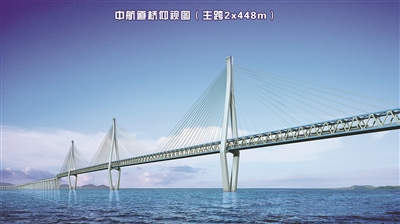
A rendering of the Tongsu Jiayong High-Speed Railway. [Photo provided to Ningbo Times]
By Jin Lu
At 10:00 a.m. on November 30, 2022, the groundbreaking ceremony of the Zhejiang Section of the Tongsu Jiayong High-Speed Railway was held in Ningbo's Qianwan New Area. Now that construction has begun, Ningbo is poised to accelerate towards a brighter future, supported by an ever-growing dense transportation network.
The 309.8-km line will have 10 stations, with a total investment of ?108.09 billion. After completion, it will bring convenience to Ningbo citizens travelling around the Yangtze River Delta for business and tourism.
Basic Facts About the Tongsu Jiayong High-Speed Railway
The Tongsu Jiayong High-Speed Railway's full name is "Nantong-Suzhou-Jiaxing-Ningbo High-Speed Railway". It will be an integral part of China's coastal railway network and an important intercity link bringing Yangtze Delta cities closer together to form Zhejiang's "Bay Area". Zhejiang Province attaches high importance to the construction of the Railway, as it aligns with the national strategy of Yangtze River Delta Integration.
The new Railway runs in the north-south direction, linking southeast Jiangsu Province with northeast of Zhejiang Province and passing through the heart of the Yangtze River Delta metropolis cluster. The line starts from Nantong West Station in Nantong, Jiangsu, merges into the main line of the existing Yantong Railway, crosses the Yangtze River via the Shanghai-Nantong Fourth Line Bridge to reach Suzhou and Jiaxing, then crosses the Hangzhou Bay via a new railway bridge before reaching Ningbo.
300.7 km of the 309.8-km line will be newly built, with a design speed of 350 km/h and bridges and tunnels taking up 98% of the total length. The line will call at 10 stations: Nantong West, Zhangjiagang, Changshu West, Suzhou North, Fenhu, Jiaxing North, Jiaxing South, Haiyan West, Cixi, and Zhuangqiao.
The construction is expected to take 5 years and an estimated investment of ?108.09 billion, according to feasibility studies. The overland section in Ningbo starts from the landing point of the sea-crossing railway bridge and runs eastwards to Zhuangqiao Station. The newly-built section (excluding the sea-crossing bridge) is approximately 62.9 km. Construction will take place over an area of 175 hectares, with an estimated cost of ?23 billion.
Significance of the New Railway
New transportation infrastructure projects will generate new prospects for Ningbo's urban expansion, economic growth, and rural revitalization, drawing a more skilled workforce to the city and stimulating growth. Railways are the lifelines of economic vitality. Stronger connectivity will help Ningbo integrate more meaningfully into the wider Yangtze River Delta metropolitan region.
The Tongsu-Jiayong High-Speed Rail will be a highly significant addition to the regional transportation network. At present, to travel from Ningbo to Shanghai or Suzhou, trains need to head west and make a detour in Hangzhou first. Between Suzhou, Shanghai, Hangzhou and Ningbo, the high-speed railway lines form a zigzag.
In 2008, the Hangzhou Bay Cross-Sea Bridge was completed and opened to vehicle traffic, a speed lane connecting Zhejiang Province to Shanghai and other Yangtze River Delta cities.
Thanks to the Cross-Sea Bridge and the connectivity it afforded, Ningbo's economy reached new heights. Now, the construction of the Tongsu-Jiayong High-Speed Railway will forge an even closer tie between Ningbo and the greater metropolitan circles of Shanghai and Suzhou; it also represents a solid step towards full high-speed railway coverage in southern Jiangsu and northern Zhejiang.
In the future, after Railway's completion, commute time within the core area of the Yangtze River Delta will be greatly shortened. By then, Ningbo, Suzhou, and Shanghai will all be within a one-hour radius. Furthermore, travel time from Ningbo to Beijing is expected to shorten to just five hours, bringing Ningbo closer to new opportunities for economic and social development.


